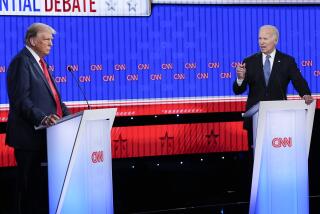Clinton’s Green Guise Is a Trap for Bush
- Share via
The 100th day of George W. Bush’s White House tenure isn’t until Sunday, but new polling data suggest an emerging conventional wisdom about the 43rd president. Overall, Bush is roughly where Bill Clinton was at the end of his first 100 days in 1993, although his numbers for certain issues skew widely; for example, W. rates high on foreign policy and low on environmental policy. But the real story, public perception aside, is the policy continuity between the two presidents. So why do some Bush policies score high, while others flunk? The answer has much to do with those who give the grades.
A new ABC/Washington Post poll finds that Bush gets his best rating on his handling of China: 67% approve. This finding squares with a CNN/USA Today/Gallup poll showing that 71% approved of the way he dealt with the Hainan island hostage crisis. In other words, Americans applaud Bush’s restrained approach to China.
Certainly that’s the approach they are most familiar with, because it was also Clinton’s course. In 1998, the 42nd president called China a “strategic partner”; in 2000, candidate Bush called China a “strategic competitor.” But semantics aside, nothing much has changed, as indicated by Bush’s recent decision not to sell Aegis-system destroyers to Taiwan.
Those who were most eager to see Bush change Clinton’s China policy are now the most outraged. The conservative magazine, the Weekly Standard, for example, has long advocated a hawkish line on China, and so when Bush seemed dovish during the Hainan standoff, it denounced the “national humiliation” of the U.S. On Tuesday, former Rep. John LeBoutillier (R-N.Y.), now a columnist for NewsMax.com, a conservative Web site, wrote, “We wimped out on China.”
But LeBoutillier’s rant against Bush revealed not only the great depth but also the true source of rightist frustration: “This administration--like the two preceding it--is clearly afraid of Beijing.” In other words, LeBoutillier is complaining about a policy that reaches back into the presidencies of both Clinton and former President Bush. For better or for worse, such a bipartisan policy isn’t about to be changed by another president named Bush. These conservatives might not like current China policy, but so far at least they have failed to sway either the president or the public.
That same ABC poll finds that Bush gets his worst numbers on the environment; just 47% approve of his handling of the eco-issue. These low numbers aren’t surprising, because W. has taken heavy fire on matters ranging from arsenic levels to the Endangered Species Act to the Arctic National Wildlife Refuge. But as Gregg Easterbrook, writing in the latest issue of the New Republic--which endorsed Al Gore last year--observes, “On almost every environmental issue, Bush has upheld the Clinton-Gore position.”
Easterbrook notes that on the notorious arsenic decision, for example, the Clinton administration postponed tightening the standard for eight years, finally issuing a new rule just days before it left office. All Bush has done since is delay further the implementation of that standard, pending additional review. Whether that’s a good policy or a bad policy is open to debate, but Bush is getting blamed for not doing the things that Clinton didn’t do.
So why are Bush’s green numbers nose-diving? Easterbrook offers this blunt answer: “Reporters seeking an instant-doomsday slant have grown adept at bashing Republicans with preposterous overstatements and phony claims of ecological crises.”
And that’s the key to understanding the divergence in Bush’s polling: the ideology of the media folk who shape coverage.
With the noisy exception of a few journalists like William Kristol, publisher of the Weekly Standard, and LeBoutillier, most journalists are doves; they are happy to support Bush’s China policy, just as they supported Clinton’s similar policy. But on the environment, “pressies” are mostly “greenies,” and so they bash Bush relentlessly. But by that logic, they could have clobbered Clinton, and they didn’t. How come? Maybe because Clinton and Gore talked a better game, or maybe because reporters are quicker to find fault in a Republican.
Mindful of the green hemorrhage in his 14 weeks in office, Bush will most likely move left. And thus the irony: If this Republican president wants to change his poll numbers, he will have to change the policies he inherited from his Democratic predecessor.
More to Read
Sign up for Essential California
The most important California stories and recommendations in your inbox every morning.
You may occasionally receive promotional content from the Los Angeles Times.










